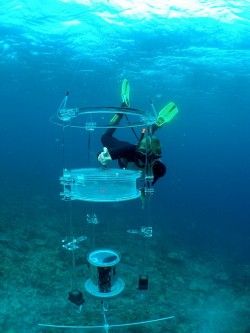Fish Larvae Use Olfactory ‘Wake Up’ Cues To Sniff Their Way Home To Reefs

Tiny fish larvae have a tremendous sense of smell.
That's the conclusion drawn in a recent study that observed how millimeter-long larvae use the power of smell to navigate their way to coral reefs located miles away, relying on olfactory signals rather than ocean currents.
"Ocean currents do not appear to influence the orientation of fish larvae," said Claire Paris from the University of Miami, author of a recent study published in PLOS ONE. “Instead, we find that fish larvae navigate by detecting turbulent odor signals transported kilometers away from the reef. Subsequently they switch to a directional cue, perhaps magnetic or acoustic, which allows them to find the reef."
While the research team had previously established that reef fish larvae can distinguish between different odors from nearby reefs and prefer the reef they settled – the 2007 experiment was conducted under controlled conditions in a lab -- the recent study is the first to show how fish larvae respond to odors in the open ocean water, said Dr. Jelle Atema, from Boston University.
For the study, researchers used larvae from damselfish and cardinalfish from an outflow plume on Australia’s One Tree Island. An O-DISC (Ocean Drifting In Situ Chamber) – a lightweight instrument that is translucent to light, sound and miniature turbulence -- was set adrift to monitor the larvae’s movement.
The two species had drastically different reactions to the olfactory stimulus. Cardinalfish sped up when they smelled odors in the plume, zigzagging within the chamber to orient themselves. Damselfish, on the other hand, slowed down and oriented themselves along the shoreline to the west, seemingly from an internal compass triggered by smell.
The study highlights the potentially dangerous effects human pollution and subsequent acidification of oceans has on marine life.
“The implications of this study are tremendous, because we have to take into account the impact that human activities might have on the smells contained within the ocean,” said Paris. “If these larvae cannot get their ‘wake-up’ cues to orient back toward the reef, they may stay out at sea and become easy prey before finding home.”
© Copyright IBTimes 2025. All rights reserved.




















